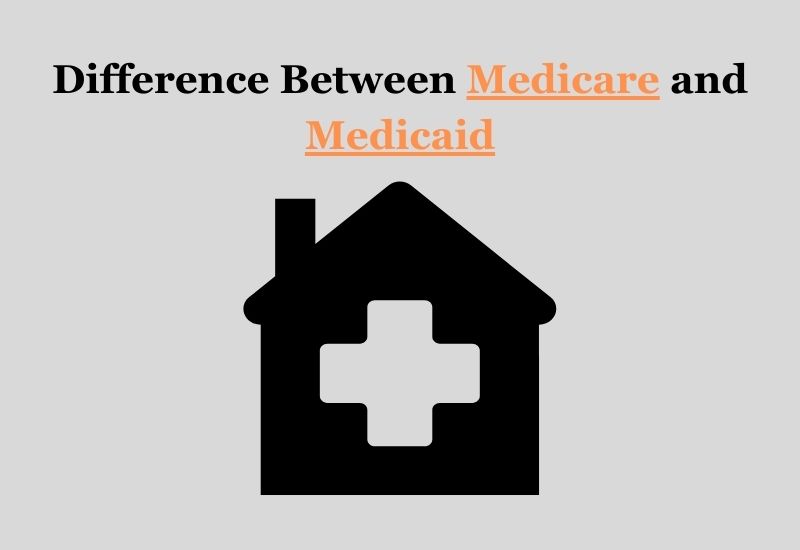The primary difference between Medicare and Medicaid lies in their eligibility requirements and targeted beneficiary populations. Medicare is a federal health insurance program for Americans aged 65 and older and younger people with disabilities.
Medicaid is a joint federal-state program that provides health coverage to eligible low-income individuals, including families with children, pregnant women, and people with disabilities. While Medicare eligibility is generally based on age and disability status, Medicaid eligibility depends on meeting income thresholds set by individual states. Medicare primarily serves seniors and people with certain medical conditions, while Medicaid aids low-income citizens.
Medicare vs Medicaid – Comparison
| Features | Medicare | Medicaid |
| Purpose | Healthcare program for individuals 65+ and certain disabilities. | Healthcare program for low-income individuals and families. |
| Eligibility | Age 65+ or certain disabilities. | Based on income, age, and other criteria set by each state. |
| Funding | Fully funded by the federal government. | Jointly funded by federal and state governments. |
| Coverage Options | Part A (Hospital Insurance), Part B (Medical Insurance), Part C (Medicare Advantage), Part D (Prescription Drug Coverage). | Varies by state, but typically includes hospitalization, doctor visits, long-term care, prescription drugs, and more. |
| Cost-Sharing | Beneficiaries may have deductibles, copayments, and coinsurance. | Minimal or no cost-sharing for eligible individuals. |
| Enrollment Process | Automatic enrollment for those receiving Social Security benefits or Railroad Retirement Board benefits. | Applicants must meet specific income and other criteria, enrollment processes vary by state. |
| Primary Beneficiaries | Older Americans, individuals with certain disabilities (ESRD). | Low-income individuals and families, pregnant women, children, disabled individuals. |
What is Medicare?
Medicare is a federal health insurance program primarily designed for Americans aged 65 and older. It also covers certain individuals with disabilities and those with End-Stage Renal Disease (ESRD). Enacted in 1965, Medicare provides a safety net for millions of older Americans, offering various benefits to ensure access to essential medical services.
Medicare Coverage
Medicare comprises different parts, each catering to specific medical needs:
Part A (Hospital Insurance)
Medicare Part A covers inpatient hospital care, skilled nursing facility care, hospice care, and home health services. It usually does not require a monthly premium if the recipient or spouse has paid Medicare taxes while working.
Part B (Medical Insurance)
Medicare Part B covers medical services and supplies necessary to diagnose or treat medical conditions. This includes doctor’s visits, preventive services, and durable medical equipment. Part B does require a monthly premium, which may vary based on income.
Part C (Medicare Advantage)
Medicare Part C, or Medicare Advantage, is an alternative to traditional Medicare. Private insurance companies approved by Medicare offers it and provides all the benefits of Part A and Part B, often with additional coverage like prescription drugs and vision.
Part D (Prescription Drug Coverage)
Medicare Part D offers prescription drug coverage, helping beneficiaries afford necessary medications. It is available through private insurance companies that contract with Medicare.
What is Medicaid?
Conversely, Medicaid is a joint federal and state program that provides health coverage to eligible low-income individuals and families. Unlike Medicare, which is mainly based on age and disability, Medicaid’s eligibility criteria consider income and other factors. Each state operates its Medicaid program within federal guidelines.
Medicaid Coverage
Medicaid offers a broad range of services, including:
Inpatient and Outpatient Hospital Services
Medicaid covers necessary hospitalizations and outpatient services to ensure individuals receive appropriate medical attention.
Doctor Visits and Medical Services
Medicaid provides access to primary and specialty care, laboratory tests, X-rays, and other diagnostic procedures.
Long-Term Care
Medicaid assists with the costs of long-term care services for eligible individuals, including nursing home care and home-based care.
Prescription Drugs
Medicaid includes coverage for essential medications, ensuring beneficiaries can access necessary prescriptions.
Maternity and Newborn Care
Medicaid supports pregnant women and newborns by covering prenatal care, delivery, and postpartum services.
Key Differences Between Medicare and Medicaid
While both Medicare and Medicaid are essential healthcare programs, several key differences set them apart:
Eligibility Criteria
- Medicare primarily serves individuals aged 65 and older or those with certain disabilities or ESRD.
- Medicaid, on the other hand, caters to low-income individuals and families, pregnant women, children, and disabled individuals.
Funding
- The federal government fully funds Medicare through payroll taxes and premiums paid by beneficiaries.
- Medicaid is jointly funded by the federal and state governments, with each state having the flexibility to design its program within federal guidelines.
Coverage Options
- Medicare provides different parts to cover hospital care, medical services, and prescription drugs.
- Medicaid offers comprehensive services, including hospitalization, doctor visits, long-term care, and more.
Cost-Sharing
- Medicare beneficiaries usually have deductibles, copayments, and coinsurance, depending on the services they use.
- Medicaid typically has minimal or no cost-sharing for eligible individuals.
Enrollment Process
- Medicare enrollment is automatic for individuals receiving Social Security or Railroad Retirement Board benefits.
- Medicaid requires applicants to meet specific income and other criteria, and enrollment procedures vary by state.
Conclusion
Understanding the difference between Medicare and Medicaid is required, as these government healthcare programs serve distinct purposes and populations. Medicare primarily covers older Americans and certain disabilities, while Medicaid assists low-income individuals and families. Both programs ensure access to essential medical services for millions of Americans.

